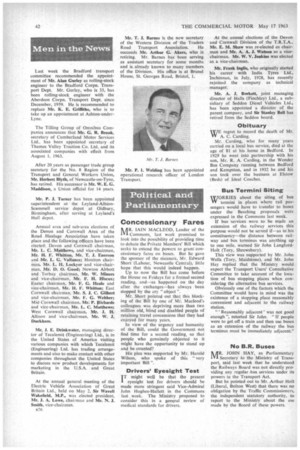Political and Parliaillentary
Page 44

If you've noticed an error in this article please click here to report it so we can fix it.
Concessionary Fares
AR. LAIN MACLEOD, Leader of the 1V1 Commons, last week promised to look into the possibility of providing time to debate the Private Members' Bill which seeks to extend the powers to grant concessionary fares on buses. But he gave the sponsor of the measure, Mr. Edward Short (Labour, Newcastle Central), little hope that this would indeed happen.
Up to now the Bill has come before the House on Fridays for a formal second reading, and—as happened on the day after the exchanges—has always been stopped by the cry "object ".
Mr. Short pointed out that this blocking of the Bill by one of Mr. Macleod's colleagues was depriving more than two million old, blind and disabled people of retaining travel concessions that they had enjoyed for many years.
In view of the urgency and humanity of the Bill, could the Government not find time for a second reading, so that people who genuinely objected to it might have the opportunity to stand up and be counted?
His plea was supported by Mr. Harold Wilson, who spoke of this "very important Bill ".
Drivers' Eyesight Test
IT might well be that the present eyesight test for drivers should be made more stringent said Vice-Admiral John Hughes-Hallett in the Commons last week. The Ministry proposed to consider this in a general review of medical standards for drivers.
Bus Termini Siting WORRIES about the siting of bus termini in places where rail passengers would have to transfer to buses under the Beeching proposals were expressed in the Commons last week.
If bus services were to be made an extension of the railway services this purpose would not be served if—as in his constituency—the distance between railway and bus terminus was anything up to one mile. warned Sir John LangfordHolt (Tory, Shrewsbury).
This view was supported by Mr. John Wells (Tory, Maidstone), and Mr. John Hay replied that the Ministry would expect the Transport Users' Consultative Committee to take account of the location of bus stopping places when considering the alternative bus services.
Obviously one of the factors which the Committee would have in mind was the existence of a stopping place reasonably convenient and adjacent to the railway station.
" 'Reasonably adjacent' was not good enough ", retorted Sir John. " If people were to get off a train and then use buses as an extension of the railway the bus terminus must be immediately adjacent"
No B.R. Buses NAR. JOHN HAY, as Parliamentary IVL Secretary to the Ministry of Transport, said last week that he understood the Railways Board was not directly providing any regular -bus services under its powers in the Transport Act.
But he pointed out to Mr. Arthur Holt (Liberal, Bolton West) that there was no obligation by the Traffic Commissioners, the independent statutory authority, to report to the Ministry about the use made by the Board of these powers.












































































































